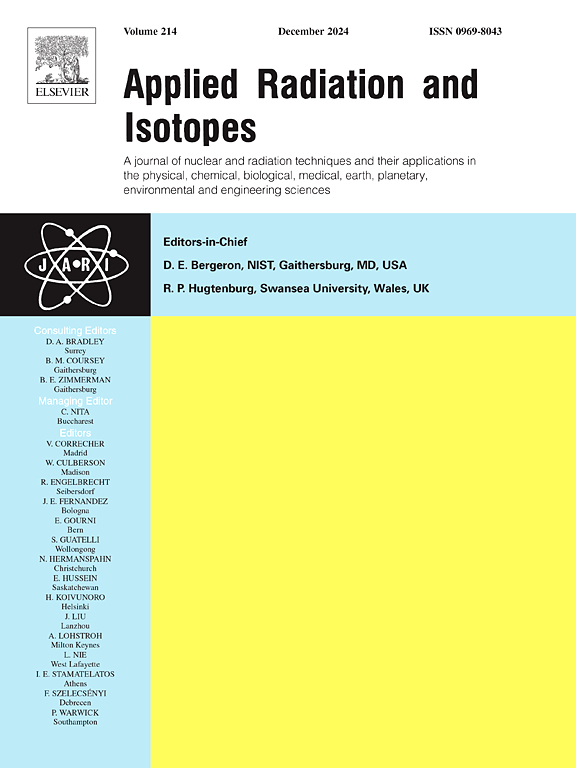Generation of list-mode digital dataset by Geant4 for comparison of radionuclide standardization algorithm
IF 1.8
3区 工程技术
Q3 CHEMISTRY, INORGANIC & NUCLEAR
引用次数: 0
Abstract
The algorithms for radionuclide standardization play a key role in accurate measurement of activity. The implementation of these algorithms requires rigorous validation to build trust and confidence in their application, which can be achieved through participation in algorithm comparisons. This work aims to generate List-Mode Digital Datasets (LMDDs) used for comparison using the Geant4 toolkit. Three models were developed based on the 4πβ(PC)-γ, 4πβ(LS)-γ, and TDCR counting systems, respectively. This paper details the data acquisition, processing, and output in simulations. Additionally, data quality assessment for LMDDs was carried out to ensure that the simulated LMDDs from the Geant4 model is reliable and suitable for algorithm comparison. Feasibility verification of these LMDDs in data analysis were performed using existing radionuclide standardization algorithms. The results demonstrate that these simulated LMDDs exhibit significant potential for application in radionuclide standardization algorithm comparison.
Geant4生成列表模式数字数据集,用于比较放射性核素标准化算法
放射性核素标准化算法在放射性的精确测量中起着关键作用。这些算法的实现需要严格的验证,以建立对其应用的信任和信心,这可以通过参与算法比较来实现。这项工作旨在生成列表模式数字数据集(LMDDs),用于使用Geant4工具包进行比较。基于4πβ(PC)-γ、4πβ(LS)-γ和TDCR计数体系分别建立了3个模型。本文详细介绍了仿真中的数据采集、处理和输出。此外,还对LMDDs进行了数据质量评估,以确保Geant4模型模拟的LMDDs是可靠的,适合于算法比较。使用现有的放射性核素标准化算法对这些LMDDs在数据分析中的可行性进行验证。结果表明,这些模拟LMDDs在放射性核素标准化算法比较中具有很大的应用潜力。
本文章由计算机程序翻译,如有差异,请以英文原文为准。
求助全文
约1分钟内获得全文
求助全文
来源期刊

Applied Radiation and Isotopes
工程技术-核科学技术
CiteScore
3.00
自引率
12.50%
发文量
406
审稿时长
13.5 months
期刊介绍:
Applied Radiation and Isotopes provides a high quality medium for the publication of substantial, original and scientific and technological papers on the development and peaceful application of nuclear, radiation and radionuclide techniques in chemistry, physics, biochemistry, biology, medicine, security, engineering and in the earth, planetary and environmental sciences, all including dosimetry. Nuclear techniques are defined in the broadest sense and both experimental and theoretical papers are welcome. They include the development and use of α- and β-particles, X-rays and γ-rays, neutrons and other nuclear particles and radiations from all sources, including radionuclides, synchrotron sources, cyclotrons and reactors and from the natural environment.
The journal aims to publish papers with significance to an international audience, containing substantial novelty and scientific impact. The Editors reserve the rights to reject, with or without external review, papers that do not meet these criteria.
Papers dealing with radiation processing, i.e., where radiation is used to bring about a biological, chemical or physical change in a material, should be directed to our sister journal Radiation Physics and Chemistry.
 求助内容:
求助内容: 应助结果提醒方式:
应助结果提醒方式:


